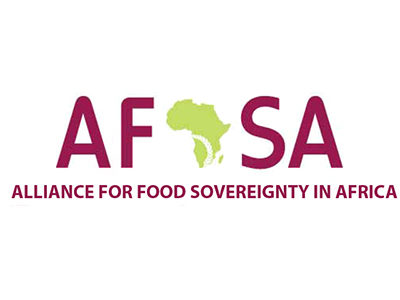Launched in 2011, the Alliance for Food Sovereignty in Africa (AFSA) is a broad alliance of civil society actors who promote food sovereignty and agroecology in Africa. These include African food producer networks, African NGO networks, indigenous people’s organizations, faith based organizations, women and youth groups, consumer movements, and international organizations that support the stance of AFSA. AFSA members represent smallholder farmers, fisherfolk, pastoralists, hunter/gatherers, indigenous peoples, faith-based institutions, and consumers across Africa. It is a network of networks, currently with 30 active members in more than 50 African countries.
AFSA aims to address problems that Africa faces related to agriculture and food, including: hunger and malnutrition; environmental degradation; pollution and loss of agricultural biodiversity; and policies and laws that marginalize small farmers, their practices and rights through a shift towards diversified agroecological systems.
Our collaboration:
SwedBio is currently supporting two of AFSA’s projects:
(1) Healthy Soils for Heathy Food Initiative
In 2020, AFSA will bring key actors together to: train trainers on agroecological practices; host a continental food systems conference on emerging agroecology markets; understand the impact of the climate crisis on African livelihoods and celebrate the effective African responses. These activities build on previous projects implemented during 2017-2019, where AFSA developed practical agroecology solutions to soil fertility challenges. Specifically, training courses with a primary focus on revitalizing soil fertility and pest management through the preparation, and use of a wide range of low-cost agricultural inputs made from locally available materials. A series of week-long training courses were delivered in East and West Africa (Kenya, Uganda, Togo and Senegal). This work is now taken forward and scaled-up in the “Healthy soils for healthy food initiative”.
(2) Host the 3rd biennial African Food Systems conference
The focus of the 2020 conference is on how markets can support the transition to agroecology. This food systems conference will also be linked to a celebration of how communities in Africa are responding to the climate crisis through culturally-based agroecological practices and diverse farmer-managed seed systems.


 Sara Elfstrand
Sara Elfstrand